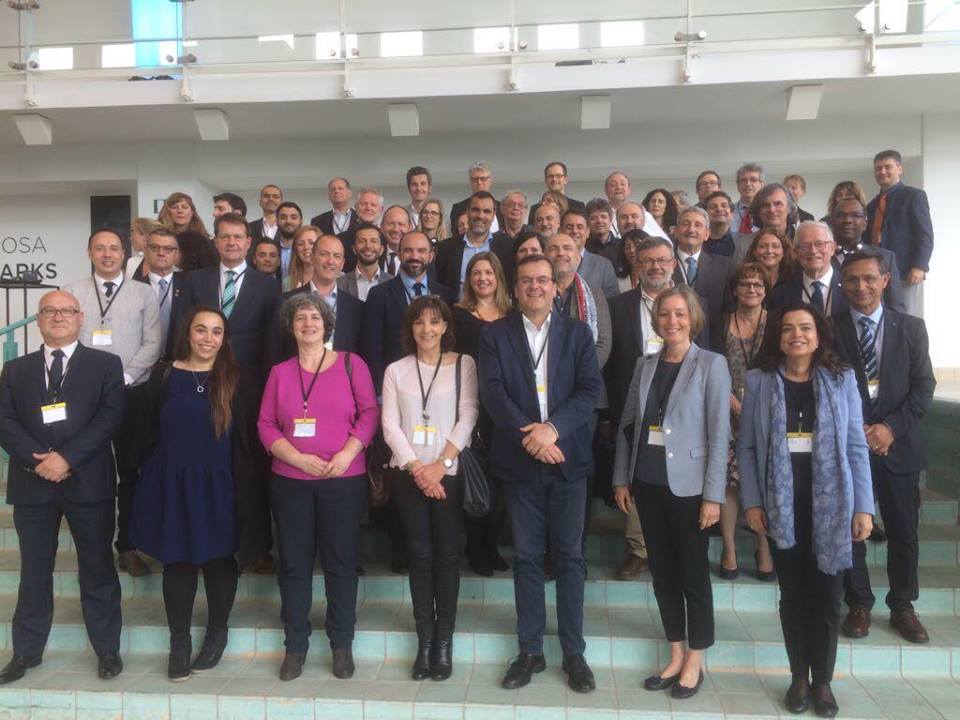Liege, Belgium, May 2018 — Some 80 delegates representing about 50 member cities attended Efus’ General Assembly meeting in Liege (BE), city which is president of the association, on 14 and 15 May. Apart from the GA itself, delegates had the opportunity to take part in several field visits, as well as in a seminar on “the city of tomorrow” and a presentation of the security component of the European Union’s “Urban Innovative Actions” initiative. Delegates also discussed Efus’ activity in 2017 and the results of the November 2017 “Security, Democracy and Cities” conference.
——————————————-
As happens each year, the General Assembly meeting was the occasion to partially renew the Executive Committee. The towns of Brno (CZ) and Pécel (HU) as well as the Brussels-Capital Region (BE) are the EC’s new members.
Also on the agenda of this GAM was a review of Efus’ activities in 2017 and of the “Security, Democracy and Cities” international conference in Barcelona, in November 2017. Delegates decided that rather than holding the next international conference in five or six years, as was done until now, it will be held as early as in November 2020.
The host city of Liege organised three field visits to present schemes it implements together with its local partners in three areas: the reception of migrants; the management of extremely vulnerable people and particularly those who live in public spaces, and culture as a tool to prevent hooliganism and radicalism.
In the first visit, participants met with representatives of the Department for the Reception of Asylum Seekers (Service d’Accueil des Demandeurs d’Asile) of the Public Centre for Social Action (Centre public d’Action sociale) of the city of Liege, and the Liege Regional Centre for the Integration of Foreign People and of People of Foreign Origin (Centre régional pour l’intégration des personnes étrangères et d’origine étrangère de Liège), which are all involved in managing and supporting migrants in partnership with the City Council and local charities.
In the second visit, they exchanged with the social care organisation Relais social du Pays de Liège (Liege County Social Centre), which works jointly with the Public Centre for Social Action (Centre public d’Action sociale), the Liege Social Cohesion Plan, and local charities in order to provide support to extremely vulnerable people. Participants also visited a night refuge. At the end of the tour, they discussed strategies for supporting homeless people in an urban environment, for fighting poverty and for preventing nuisance caused by rough sleepers in public spaces, always while respecting fundamental rights.
Three initiatives were presented in the third visit on the topic of culture as a tool to prevent radicalisation and hooliganism: the volunteer association Les Grignoux, who uses cinema as an educational tool; the Theatre of Liege, which presents a play aimed at raising awareness on violent radicalisation, and the Fan Coaching programme aimed at football supporters.
The conference on “The city of tomorrow”, organised by the city of Liege on the occasion of Efus’ GA meeting, also focused on the links between urban planning and social cohesion and security/crime prevention.
Lastly, Francesco Amodeo, of the EU’s Directorate-General for Regional Policy, presented the urban security aspect of the EU’s Urban Innovative Actions (UIA) initiative. This year will be the fourth annual call for projects as part of UIA, but it is the first time that urban security is included in the call, which gives Efus members the opportunity to present their projects and benefit from this line of EU funding.



